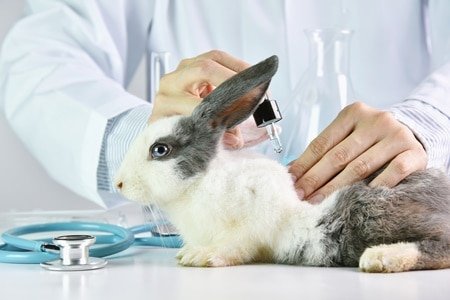Can Pet Rabbits Have Allergies? (Food, Seasonal, Hayfever, Dust)

Hayfever, dust and food allergies are fairly common in pet rabbits, although the severity can vary greatly from animal to animal. Some will have only minor sniffles and sneezes, while others may experience severe respiratory distress. Seasonal allergies are usually the most mild, but they can still be a nuisance for both rabbit and owner.
Yes, rabbits can have allergies. The most common allergies are to food, hayfever, and dust. Seasonal allergies are also possible.
If your rabbit has any of these symptoms, it’s important to take them to the vet for proper diagnosis and treatment.

Credit: www.pinterest.co.uk
Can Rabbits Be Allergic to Dust?
Yes, rabbits can be allergic to dust. Dust allergies are relatively common in rabbits and can cause a variety of symptoms, including sneezing, runny nose, watery eyes, and coughing. If your rabbit is displaying any of these symptoms, it’s important to take them to the vet for an evaluation.
Dust allergies can be difficult to manage, but with the help of your veterinarian, you can find a treatment plan that works for your rabbit.
Can Rabbits Suffer from Hayfever?
Much like humans, rabbits can suffer from hayfever. This is caused by an allergy to pollen, which is typically found in hay. Symptoms of hayfever in rabbits include sneezing, runny nose, watery eyes, and itchiness.
If your rabbit is displaying these symptoms, it’s important to take them to the vet so they can be properly diagnosed and treated.
How Do I Know If My Rabbit Has Allergies?
There are a few key ways to tell if your rabbit has allergies. If you notice any of the following symptoms, it’s possible that your rabbit is allergic to something in their environment: 1. Excessive itching or scratching.
How Can I Help My Rabbit With Hay Allergies?
If you think your rabbit may have hay allergies, the first step is to speak with your veterinarian. They will be able to confirm whether or not your rabbit has hay allergies and recommend the best course of treatment.
There are a few things you can do at home to help your rabbit if they have hay allergies.
First, try switching to a different type of hay. There are many types of hay available, so there’s bound to be one that doesn’t cause your rabbit any problems. Secondly, make sure that the hay you are giving them is fresh and free from dust.
Dusty hay can irritate a rabbit’s lungs and make their symptoms worse. Finally, give your rabbit plenty of water to drink. This will help to flush any allergens out of their system and keep them hydrated.
If you follow these tips, you should see an improvement in your rabbit’s symptoms.
Allergies in Bunnies
Why am I Suddenly Allergic to My Rabbit
If you’ve suddenly developed an allergy to your rabbit, it’s important to figure out what’s causing the problem. There are a few possibilities:
1) You could be allergic to something in your rabbit’s fur or dander.
This is the most common cause of pet allergies.
2) You could be allergic to something in your rabbit’s cage, such as straw or wood shavings.
3) You could be allergic to the food you’re feeding your rabbit.
Many commercially-prepared rabbit foods contain soy or other ingredients that can trigger allergies.
4) You could have developed an allergy to something else in your environment, such as dust mites or pollen. If you suspect this is the case, it’s important to see an allergist for proper diagnosis and treatment.
If you’re suddenly allergic to your rabbit, don’t despair! There are many ways to manage pet allergies and still enjoy the companionship of your furry friend.
What Foods are Bunnies Allergic to
Bunnies are allergic to many different kinds of foods. Some of the most common allergies include hay, pellets, carrots, and corn. These allergies can cause a variety of symptoms including itching, runny nose, watery eyes, and sneezing.
If your bunny is displaying any of these symptoms, it’s important to take them to the vet right away to get checked out.
If I’M Allergic to Cats Will I Be Allergic to Rabbits
If you’re allergic to cats, there’s a good chance you’ll be allergic to rabbits as well. Both animals produce allergens that can cause symptoms like sneezing, wheezing, and watery eyes in people who are sensitive to them. If you have severe allergies, contact with either animal could trigger a dangerous reaction called anaphylaxis.
So what’s behind this cross-species allergy? Cats and rabbits belong to the same family of animals, which means they share many of the same proteins. These proteins are what cause an allergic reaction in people who are sensitive to them.
If you think you might be allergic to cats or rabbits, it’s important to see an allergist for testing. They can determine whether or not you’re actually allergic and advise you on how to best avoid exposure to these furry creatures.
Can Bunnies Have Seasonal Allergies
Seasonal allergies are a common problem for many people, and it turns out that even bunnies can suffer from them! Just like people, bunnies can be allergic to pollen, dust, mold, and other airborne irritants. Symptoms of seasonal allergies in bunnies include sneezing, watery eyes, runny nose, and itchiness.
If your bunny is showing any of these symptoms during allergy season, talk to your vet about possible treatment options.
What Can Cause Allergic Reactions in Pet Rabbits?
Pet rabbit allergies causes and treatments can vary depending on the individual rabbit. Common allergens in rabbits include certain foods, dust mites, pollen, and environmental factors. Allergic reactions can manifest as sneezing, coughing, itchy skin, or respiratory issues. Treatments may involve eliminating allergens from the rabbit’s environment, providing proper ventilation, and medications prescribed by a veterinarian.
Conclusion
Pet rabbits can suffer from allergies just like people. The most common types of allergies are food allergies, seasonal allergies, hayfever, and dust allergies. Allergies can cause your rabbit to itch, sneeze, and have watery eyes.
If your rabbit is allergic to something in its environment, you may need to make some changes to its diet or housing.
